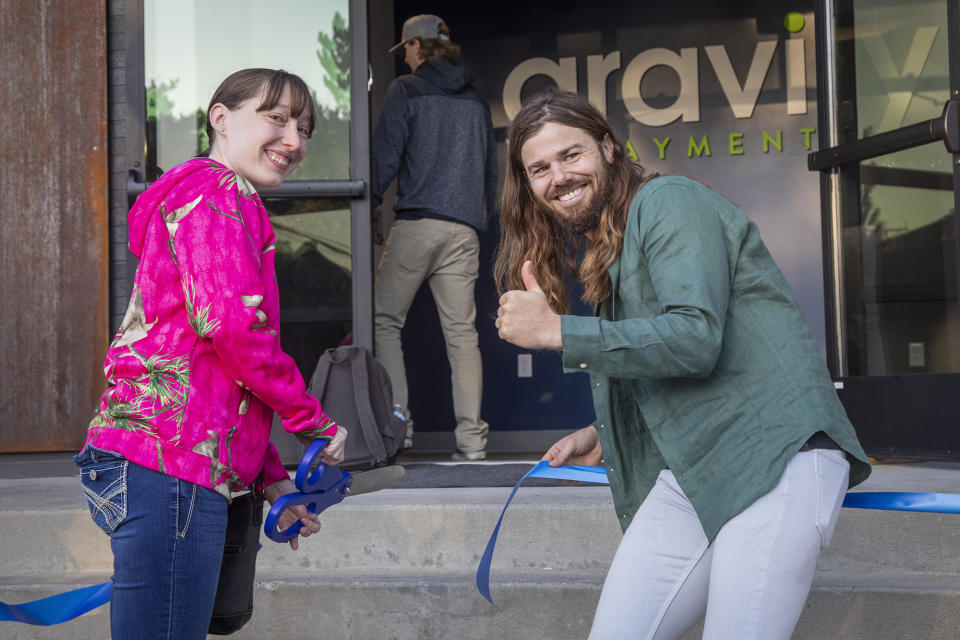Company that avoided layoffs pays back employees for voluntary salary cuts
Employees of Gravity Payments who collectively volunteered to take pay cuts during the coronavirus pandemic to avoid layoffs are now getting paid back what they sacrificed.
“With the concern that we have, which is that the pandemic could go on for quite a lot longer, we just felt like we owed it to really trust those employees and give them that money back,” Dan Price, the company CEO, told Yahoo Money.
Gravity Payments used company savings, available debt, and its recovering revenue to repay employees. The average employee got about $4,300 in back pay as the company’s financial situation improved.

‘Going to lose over half of our business’
In the first two months of the pandemic, the credit card processing company, which caters to small businesses, saw revenues tank.
“Going back to the beginning of March, we could see that we are going to lose over half of our business,” Price said. “What that looked like in terms of a loss in dollars was up to $1.5 million-per-month loss.”
To survive, the company would need to reduce its workforce. But Price’s nearly 200 employees had another idea. Instead, they suggested voluntary pay cuts based on their individual financial situations.
Read more: Coronavirus: How to find a job after a layoff
Some employees could afford just a 5% reduction, while others took 30% to 50% less. Ten employees asked to go without pay altogether through the crisis. Overall, 98% of employees participated, giving up a total of $750,000 of pay.
‘Working more hours around the clock’

While Gravity Payments lost 55% of its clients’ base volume in March, the company’s merchant base has since grown and is now down just 20% from its pre-pandemic levels. The recovery came from new clients. Gravity Payments added more clients during the pandemic than at any other point in the company’s history.
Adding more new customers as well as supporting the existing ones meant that many employees had to double their productivity to meet the demand.
“Yes, our employees did take on average over 20% pay cut on a voluntary, anonymous basis, so that we wouldn't have to do layoffs,” Price said. “What's also true is that they've been working more hours around the clock helping these small businesses than they ever have.”
Read more: Here’s how to get the most out of your virtual internship
Employees also volunteered to work during weekends, with one employee helping a small business do deliveries because it needed extra help. Despite the decreased pay, the company still “all just worked together” to get through those difficult times, Price said.

The alternative to voluntary pay cuts would have meant a 20% reduction of the company’s employees. That would have been “a much different and much darker story,” Price said.
“I'm sure it would be a big loss of trust if we, all of a sudden, decided to do layoffs. It would undercut exactly the heart of how the company is supposed to work,” Price said. “This company has always been about sticking up for people over money, over greed, over corporations.”
‘I'm going to keep my pay at zero’
Since 2015, Price decided to build a different, more employee-centric company. Along with his colleagues in March, Price also cut his salary — but to zero. This is not the first time he slashed his own pay to help his employees.
Five years ago, he made headlines when he reduced his salary from $1.1 million to just $70,000 and guaranteed a minimum wage of $70,000 a year for all his employees.
Now Price won’t raise his salary after the company received a Paycheck Protection Program loan from the federal government intended to help small businesses stay afloat during the pandemic. The loan funds must support two months of payroll for a small business’s employees.
“I just don't think it's appropriate for CEOs to be making money from that,” said Price, who is a frequent critic of lavish CEO pay. “So, I'm going to keep my pay at zero for at least another month or two.”
Denitsa is a writer for Yahoo Finance and Cashay, a new personal finance website. Follow her on Twitter @denitsa_tsekova.
Read more:
Companies filing for bankruptcy use loophole to give CEOs huge bonuses
Read more personal finance information, news, and tips on Cashay
Follow Yahoo Finance on Twitter, Facebook, Instagram, Flipboard, SmartNews, LinkedIn, YouTube, and Reddit.

 money
money 

